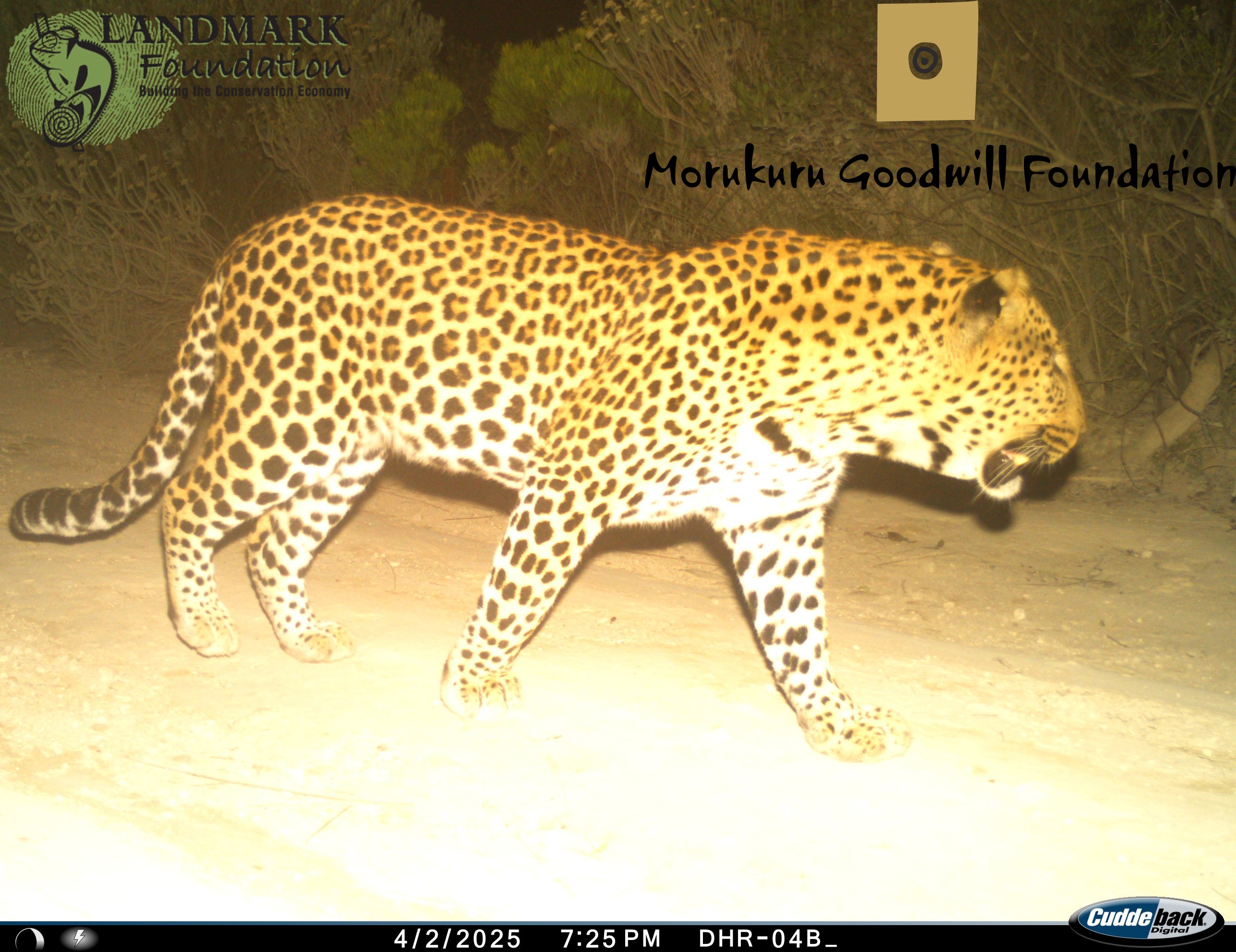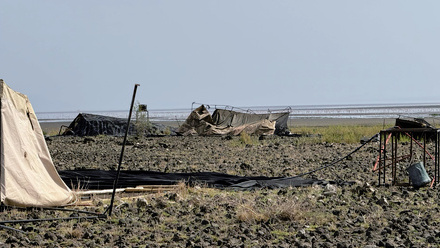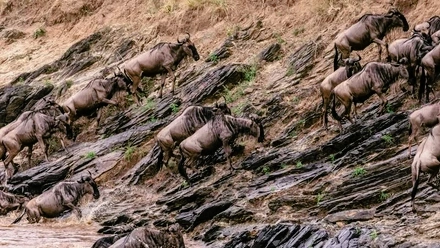Leopards in De Hoop Nature Reserve

Camera Traps Confirm Presence of Leopards in De Hoop Nature Reserve
A milestone moment for leopard conservation, as two leopards are sighted through joint efforts of Morukuru Goodwill Foundation, Landmark Foundation, and CapeNature.
Cape Town, 2 May 2025 – In an exciting development for conservation in the Overberg region, two leopards have been positively identified on camera trap footage from the De Hoop Nature Reserve, thanks to a collaborative effort by the Morukuru Goodwill Foundation, Landmark Foundation, and CapeNature.
“This is an incredibly hopeful moment,” said Ed Zeeman, co-founder of Morukuru Family and the Morukuru Goodwill Foundation. “To confirm the presence of not one, but two leopards, is a testament to the power of patient, long-term conservation work – and meaningful collaboration. It underscores our shared commitment to protecting not only leopards but the broader biodiversity of De Hoop.”
“At CapeNature we believe in the value of partnerships. The De Hoop Partnerships demonstrate returns across the dimensions of conservation, local economy development and job creation.”, says Dr Ashley Naidoo, CEO. “Confirmation that the Greater De Hoop Nature Reserve and surrounds still contributes to favourable habitat for Cape leopard in the Overberg region highlights the success of continuous collaborative conservation efforts. These monitoring projects provide valuable information to ensure the long-term conservation needs for the management of the species.”
Over a 50-day period, 4,223 images were collected across the reserve, revealing the presence of a roaming male leopard moving between the Potberg office and Infanta, as well as a potential female on the Infanta side. These sightings mark a significant step forward in understanding the behaviour, territory, and ecological role of these elusive cats.
The camera traps, in operation since February 2025, are equipped with both day-colour and night-infrared capabilities. They also recorded 17 other mammal species, including caracal, porcupine, honey badger, baboon, Cape grysbok, and bushpig. This rich variety of wildlife data highlights the ecological significance of the reserve and provides critical insights into species distribution, habitat use, and the interconnectedness of the ecosystem.
“This is exactly the kind of data we hoped to uncover,” said Dr Bool Smuts, General Manager of the Landmark Foundation. “Camera traps offer a non-intrusive way to monitor rare and wide-ranging species like leopards. The presence of a male and possible female suggests a viable range and the potential for population stability, provided we continue to protect and connect these habitats.”
As part of this ongoing initiative, guests at Morukuru Ocean House and Morukuru Beach Lodge have the unique opportunity to engage with the project through field experiences such as camera inspections, photographic interpretation, and presentations by Landmark Foundation experts.
The leopard monitoring project is a cornerstone of a broader conservation strategy aimed at securing ecological corridors and mitigating human-wildlife conflict in the region.
This initiative is made possible through the partnership between the Morukuru Goodwill Foundation, Landmark Foundation and CapeNature, working together to ensure a sustainable future for South Africa’s wildlife.
Ends
For more information, contact Marketing Manager, Rinse Wassenaar [email protected]
Landmark Foundation
Landmark Foundation’s mission is to conserve and protect South Africa’s wildlife, focusing on apex predators like the Leopard, whose plight is encompassed in the plight of other species and their habitats. We believe in a holistic approach that integrates science, community engagement, and policy advocacy to create sustainable ecosystems.
https://www.landmark.foundation/
Morukuru Family
Reconnecting family, friends, nature, and you, is the promise of Morukuru Family, a renowned award-winning hospitality group and a member of Relais & Châteaux. Morukuru Family’s three exclusive-use houses in Madikwe Game Reserve as well as Morukuru Ocean House in De Hoop Nature Reserve, each offer the ‘Morukuru Freedom Concept’ for guests to create a unique and personalised holiday. Morukuru Beach Lodge in De Hoop Nature Reserve can be booked per suite, or on an exclusive-use basis. AtholPlace Hotel & Villa in Sandton, Johannesburg, consists of a 9-room boutique hotel and a 4-bedroom private villa. Morukuru Family is dedicated to securing a sustainable future for the reserves and protecting our planet and offer specialised travel packages - Safaris with a Purpose and Coastal Conservation with a Purpose.
www.morukuru.com
Morukuru Goodwill Foundation
Morukuru Family’s commitment to conservation, community, and sustainability led to the establishment of Morukuru Goodwill Foundation (MGWF) in 2007 by owners Ed and Anka
Zeeman. Working in partnership with the Parks Board and CapeNature, and together with local communities we support nature-based projects, educate, mentor and ultimately empower the conservation of Africa’s wildlife sanctuaries.
www.morukuru.com | https://morukuru.com/morukuru-goodwill-foundation/
Relais & Châteaux – A Movement with Meaning
Relais & Châteaux, established in 1954, is an association of 580 unique hotels and restaurants throughout the world, owned and operated by independent entrepreneurs–most often families–who are passionate about their craft and deeply committed to forging warm, lasting relationships with their guests. Relais & Châteaux members protect and promote the wealth and diversity of the world’s culinary and hospitality traditions, to ensure they continue to thrive. They are equally dedicated to preserving local heritage and the environment, as articulated in the association’s Vision presented to UNESCO in November 2014.
www.relaischateaux.com
CapeNature
CapeNature is a public entity mandated to promote and ensure biodiversity conservation within the Western Cape. The Entity manages most of the mountain catchments and reserves that supply ecosystem services to the citizens of the Western Cape. This requires good scientific data, a sound understanding of fynbos ecology and commitment to the principles of integrated biodiversity management and planning. Most of this work is in remote areas out of the public eye but has a direct bearing on the quality of life of millions of people in the province.
www.capenature.co.za


